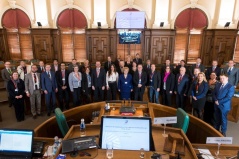National Assembly of the Republic of Serbia / Activities / Activity details

22 February 2015 Participants of the meeting
Wednesday, 25 February 2015
Member of Committee on Labour, Social Issues, Social Inclusion and Poverty Reduction at Meeting of Committees on Employment and Social Affairs
Dr Aleksandar Peranovic, member of Committee on Labour, Social Issues, Social Inclusion and Poverty Reduction, took part in the meeting of chairpersons of EU parliamentary committees on employment and social affairs, on 22 and 23 February 2015, in Riga, Latvia.
In addition to the chairpersons and representatives of the EU member states’ and candidates’ relevant parliamentary committees, the meeting was also attended by representatives of the European Commission, European Parliament, relevant ministries, expert organisations and NGOs.
The meeting was opened by Latvian Parliament Speaker Ināra Mūrniece and chaired by Aija Barca, Chairperson of the Latvian Parliament’s Social and Employment Matters Committee. The topics of the three-session meeting were employment with a focus on the inclusion of the most vulnerable groups into the labour market, social entrepreneurship potentials and the implementation of the Youth Guarantee initiative.
The main priorities of the Latvian Presidency of the EU Council were the focus of the meeting, viz. inclusive Europe with emphasis on an inclusive and sustainable labour market, long-term solutions for unemployment issues and working conditions for people with disabilities.
Committee member Dr Aleksandar Peranovic took part in the session dedicated to the first year of implementation of the Youth Guarantee initiative – support fund for young people under the age of 25 for job, apprenticeship, traineeship, or continued education within 4 months of them registering on the job market. He said that Serbia, with its low rate of activity and employment, and high unemployment rate (41.7%) suffers many of the same problems as the European Union when it comes to youth employment. These indicators are considerably worse than the indicators for the population as a whole (16 – 65 years of age) and worse among young women than young men. The fact that this section of the population is still undergoing formal education, a period when most young people are not active on the job market, also affects the low rate of activity among the youth. The fact that as much as 20.5% of young people (15 – 24 years of age) are neither employed nor in training or schooling is particularly troubling. The Republic of Serbia 2015 National Employment Action Plan contains a special service package for young people (15 – 30 years of age), which requires the counsellors at the National Employment Agency to focus more of their efforts on the youth. In addition, there is an internship/training programme, an active employment policy measure aimed at providing skills for independent work in one’s area of training, without employment contract, and as a condition to be able to take the intern or state licensing exam, with an employer in the private sector. In the course of the programme, the National Employment Agency pays the people involved monthly financial aid and contributions for work-related injuries and conditions and finances the licensing exam. The programme takes 6 to 12 months. MP Peranovic said that Serbia is not eligible for the Youth Guarantee programme.
At the meeting, the representative of the Committee on Labour, Social Issues, Social Inclusion and Poverty Reduction had also an opportunity to exchange views and experiences in areas where Serbia still lacks a developed set of regulations such as social entrepreneurship and social enterprises, and about the mode of operation of the Youth Guarantee fund.
-
9.00 - meeting of the National Assembly Speaker concerning consultations regarding the further work on the implementation of the DIHR recommendations from the Final Report of the Observation Mission for the elections for members of the National Assembly held on 17 Decemberfulfilment of the recommendations how to improve the electoral process in the Republic of Serbia (National Assembly Building, 14 Kralja Milana Street, green salon)
-
12.00 - visit of the students of the Belgrade Agricultural School to the National Assembly House (National Assembly House, 13 Nikola Pasic Square)


